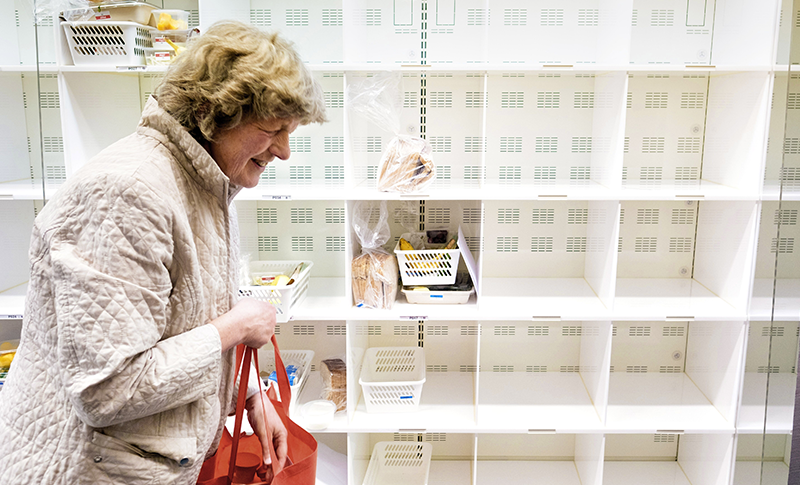A long-term nutrition study is due to start at the end of April, with 114 test subjects taking part. At the same time, there are at least 15 more WUR studies ongoing, all of which need test subjects. Where do the people come from who are willing to contribute to science for a modest volunteer’s fee?
PhD candidate Roos van ’t Spijker (Human Nutrition & Health – HNH) is coordinating the EXPLAIN study in which over 100 test subjects – aged 45 to 75 and with a BMI of between 23 and 40 – eat only the food provided to them by the researchers for two periods of eight weeks. She hopes the results will enable her to compare the health effects of plant-based meat substitutes with those of meat. ‘We are looking for a lot of participants and we ask a lot of them,’ says Van ’t Spijker.* ‘What is more we are looking for a specific group of people who meet all the criteria. I think at the information meetings and screening sessions, we must have seen four times as many people as will take part in the end. A lot of them drop out or turn out not to be suitable.’
4000 people
One of the recruitment methods available to Wageningen PhD candidates is a test subjects database. This database, which was digitalized in 2018, is intended to bring together all the recruitment of test subjects within WUR. ‘Annually, WUR needs between 650 and 800 test subjects,’ says Maartje van den Belt of Wageningen Food and Biobased Research (WFBR). She and her colleague Anne van de Wiel (HNH) manage the test persons database.
Four times as many people attend information and screening sessions as take part in the end
Van de Wiel: ‘Because we need so many test subjects year in year out, it’s handy for us to be able to sign up a lot of people at the same time. The departments of Human Nutrition and Health and of Food Health and Consumer Research use the database a lot, but other departments do so occasionally as well.’
The database now contains details of about 4000 people. ‘That sounds like a lot but they are adults between the ages of 18 and 100 living roughly between Den Bosch and Zwolle,’ says Van de Wiel. ‘Some of the information is out of date. People who have moved without letting us know, or students whose email address isn’t right anymore because they’ve graduated. And then not everyone can take part in every study, because each study has its own criteria.’
Stress
Participants in the 40-60 age range are particularly hard to find, say Van den Belt and Van de Wiel. Van ’t Spijker finds the same. ‘Besides our internal test subjects database, we used an external platform for test subject recruitment, adverts in local papers and digital media which we thought our target group would be likely to use.’ After three months of intensive recruitment efforts, information provision and screening, Van ’t Spijker had about 50 suitable participants, 31 of whom recently started on the study.
‘The rest of the volunteers are waiting in the wings to be in the second group in my study, but we have to find at least 60 participants before that group can start in September – while at the same time carrying out the research with the first group,’ says Van ’t Spijker. ‘By the time the second group has gone through the whole study it will be March 2025 and I’ll already be two and a half years into my four-year PhD . Then I still have to analyse, write up and publish my research results.’
Annually, WUR needs about 650 to 800 test subjects
That is not giving Van ’t Spijker sleepless nights, though. ‘I’m focussing now on the practical work. I think it will be very nice to analyse the data I have amassed myself. And large-scale intervention studies like this one are common in the research group I work in. I know several PhD candidates who had a similar timeline and still managed to round off their projects.’
For the next group, Van ’t Spijker hopes to be able to make use of the database again. ‘Those participants are familiar with nutrition studies and know what they’re signing up for. I think it’s partly thanks to the database that WUR is so good at doing nutrition research. But that success has its downside, because people have a lot of studies to choose from.’
Serial test subject
Yvette Telleman can confirm that there are plenty of nutrition studies to choose from. She has been working for WUR (WFBR) for nearly 10 years now, and can no longer count the studies she has taken part in on the fingers of two hands. ‘I often took part in small taste studies that just took an hour, but I also participated in long-term studies of six months or longer. I’m a researcher myself, so I know how important test subjects are.’
‘If I feel it will negatively affect my private life, I turn down the invitation,’ says Telleman. ‘I don’t mind giving blood, but I’m not in for any injuries to a healthy body. And I don’t do MRI scans, which are very time-consuming and are often done during working hours.’
During a study she sometimes meets people she’s seen during previous studies, who also take part repeatedly. Van den Belt and Van de Wiel confirm this. ‘In nearly every study, we see one or more test subjects who have taken part before.’
In spite of the enthusiasm of participants like Telleman, researchers cannot always recruit enough test persons in time for their studies. ‘In that case, researchers have to report to the medical-ethical assessment committee that they can’t get the target number of people,’ explains Van de Wiel. ‘At that point there are two possible emergency measures: adapt the criteria or the number of test subjects.’ That is done in 20 per cent of cases.
In the worst-case scenario, a researcher has to conclude that the study cannot go ahead. Van de Wiel: ‘Because it must be ethically justifiable towards the people who do take part. A study in which you know beforehand that the evidence will be insufficient is pointless, but for junior researchers, it is disastrous.’
*The fee for participants in this study is 100 euros plus travel costs of up to €7.50 per attendance.
Here you can find general information about participating in scientific research at WUR.

 A participant in the nutrition study collects the food prepared specially for her for the coming days. Photo Guy Ackermans
A participant in the nutrition study collects the food prepared specially for her for the coming days. Photo Guy Ackermans 

